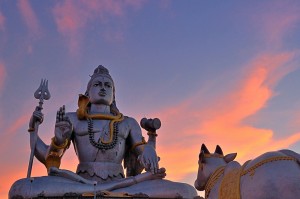In my previous post I argued that worship is what is owed in justice to the divine, and that a god who is the creator, the ultimate reality, is more worthy of worship than any lesser god—always presuming that the god actually exists. (Non-existent gods are not worthy of worship, however well we might have “crafted” them.)
I cannot speak for all religions practiced in the world today, but certainly the largest claim to reflect ultimate reality in one way or another. The usual choices are pantheism, deism, and monotheism. This includes Judaism, Islam, at least some flavors of Hinduism and its offshoots, and Christianity and most of its offshoots.
Pantheism I regard as a non-starter, and for the same reasons I regard scientific materialism as a non-starter. In pantheism, God is all that is, and all that is is God. In scientific materialism, matter is all there is; the existence of the universe (or multi-verse, or what have you) is simply a brute fact, not to be explained. Now, I am grateful for the universe around me; it is a thing of great beauty, not to mention being essential for my day-to-day life. But I cannot for the life of me see any reason to worship it. Calling all that is “divine” doesn’t seem to change anything.
Further, I associate with pantheism the notion that the material world is an illusion, that the very self is an illusion. (Possibly I’m doing pantheism a disservice.) But I find it interesting that there are materialist philosophers of mind (Daniel Dennett, I’m looking at you) who also claim that consciousness is an illusion. I disagree with Descartes about a number of things, but I have to take my selfhood as a fundamental datum; I can’t take seriously any metaphysics that denies it, any more than I can take seriously any metaphysics that denies the existence and intelligibility of objective reality.
In short, if pantheism is true, I have trouble seeing what there is there to worship.
Deism is the notion that God created the world and then left it running without interference; and in particular the deistic God is transcendent but not immanent. This is a great creed for people who don’t want to be bothered; God doesn’t bother further with them, and they (except for expressing respect when asked) don’t need to bother further with Him. Such a God is perhaps owed worship, or at least respect, but isn’t the kind of being one could have any kind of relationship with.
For me, deism founders on the rock of my experience, which is of a God who cares, a God who seeks relationship with men and women.
So much for pantheism and deism. I hasten to add: I have never considered either as a live option, so the discussions above are mere sketches. Christians who came to the faith after having espoused either one would doubtless have more to say.
That leaves some flavor of monotheism…but that’s tomorrow’s post.
A final thought: if pantheistic or deistic notions of the divine are not worthy of worship, why do we find people worshipping them? In my view, men and women by their nature can only find their fulfillment in the God Who Is; we have a natural yearning for the divine. Religions have arisen all over the world because of this natural yearning; and to the extent that adherents of these religions approach the divine, they are approaching the God Who Is, the God who is worthy of worship however well or poorly we understand Him as He Is.













